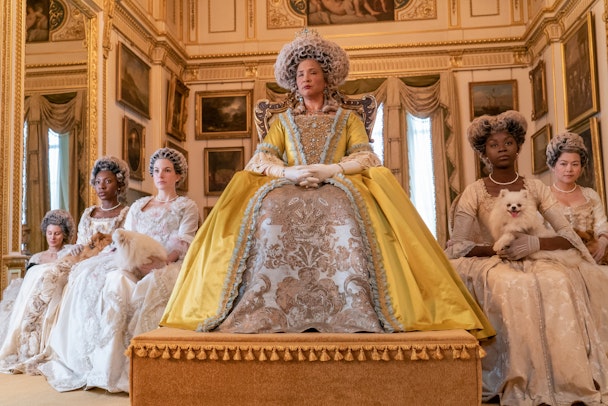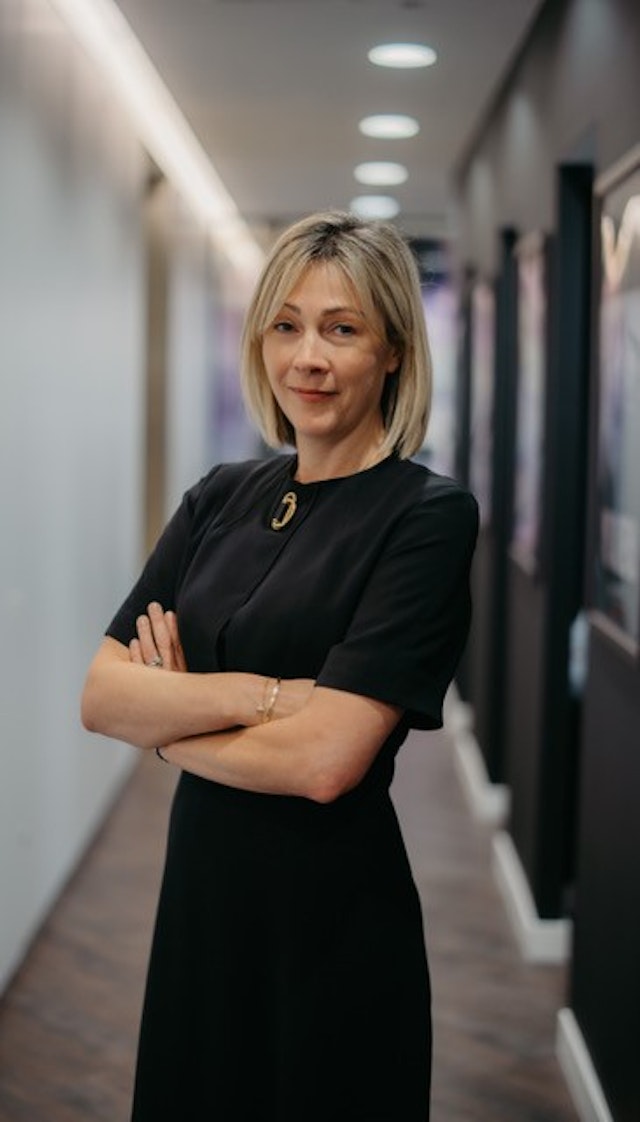Netflix production chief on spending $1bn-a-year on UK shows – if it can find the talent
Netflix production chief Anna Mallett holds a $1bn-a-year budget to produce content in the UK. She tells Ian Burrell she is happy to keep spending it – as long as the streaming giant can find the talent to make it.

Bridgerton - one of the hit shows to roll off the Netflix UK production line
Netflix has pledged to continue its $1bn-a-year content spend in the UK, but wants to see an industry-wide effort to ensure a boom in Britain’s television and film sector is not held back by a shortage of specialist skills.
Anna Mallett, Netflix’s production chief for EMEA, UK and APAC, tells The Drum that Netflix “has a long-term commitment to the UK as a really important place to make brilliant content,” but calls for a greater pan-industry effort to improve training programs from entry level to departmental management roles. “It’s really important that all of us involved in the UK content ecosystem play our part in developing and nurturing that next level of talent because, to be honest, if we don’t have the talent it’s going to be quite hard to make the content,” she says.
As Netflix launches the much-anticipated second series of its Regency drama Bridgerton, it is investing heavily in UK studios and Mallett says she is hopeful that the shortage of production space that has threatened to hold back a boom period in British film and TV content is now being overcome.
A report published last summer by property research firm Lambert Smith Hampton found that “the current supply of studios is widely-acknowledged within the film and TV industry as insufficient to meet demand”. The report noted that 2.6m square feet of new stages were in the planning pipeline, in addition to the existing 4.2m square feet of stages in the UK’s film and TV sector.
In the past six months Netflix has doubled the size of its hub at Shepperton Studios in Surrey to 31 stages. It has taken a long-term lease at nearby Longcross Studios and announced plans for a 230,000 square feet facility to open this year at Segro Park in Enfield, north London. “Our belief is that the supply is now coming to meet the demand and I think that’s what gives us confidence that [there is] an opportunity [in the UK],” says Mallett.
Netflix’s $1bn-a-year content spend in the UK will continue, she says. “It’s not really changing from that going forward – I think that demonstrates the importance of the market to us,” she says of a territory that is Netflix’s biggest production hub outside North America. Netflix already employs 20,000 people on UK productions and the figure is set to increase.
Where Mallett does express concern is over the industry’s ability to generate sufficient skilled staff to meet the boom in demand. “I do think that everyone needs to play their part in building this next generation of talent.” Netflix has committed £1.2m to its Grow Creative UK program, which supports 1,000 people with training designed to bridge skills gaps, offering experience working on shows including Sex Education and The Witcher made at Arborfield Studios in Berkshire and at various locations around the UK.
In addition to training young people for entry level positions, she says Netflix needed people ready to take on “very senior roles” in specialist areas such as production management, post-production and visual effects.
“From our point of view, it’s important to think about how you can take people who are perhaps in the middle of their career and help them get the skills and capabilities to become those heads of department that are also really critical for us in terms of producing the content we want to produce.”

Improving diversity is a top priority for Mallett, who is a board member of industry body ScreenSkills. Netflix instituted a Diverse Directors Program for its hit crime drama Top Boy (which returned for series 4 on March 18), seeking to address a historic absence of BAME-background directors in British TV and film. It has also introduced a rotational training program to give diverse staff opportunities in the making of the new season of Bridgerton, which when not being shot in Bath is mostly made at a studio in Uxbridge developed from a former paint factory.
The commitment to diversity is reflected in the production slate of Netflix vice-president of original series Anne Mensah, a former BBC executive. She has championed diverse British talent including Stormzy’s cultural strategist Akua Agyemfra, the filmmaker and rapper Rapman (Andrew Onwubolu) and the screen writer Bisha K Ali, who wrote Sex Education.
“We should always be thinking about having as diverse a set of people as possible making our content,” says Mallett. “The last thing it is is a box-ticking exercise. It is about training and increasing diversity wherever we think we need to and ensuring that people can look at production and think this is somewhere I can really build a career.”
Mallett was CEO of ITN before she was poached by Netflix in April 2021. Her departure from the news provider after only two years at its helm came as a surprise. She emailed colleagues at ITN’s Gray’s Inn Road headquarters to say she felt the streamer had “offered an opportunity…I simply couldn’t turn down”.
A year into her new role, she reflects that it was the international nature of Netflix’s operations that enticed her to move. “It’s exciting for me because it has this global footprint and I love this concept that you can make this content anywhere and it can be loved everywhere. I find that quite inspiring.”
Referencing last year’s success of Squid Game, she says “it’s fantastic” that “something from Korea with subtitles can just become a phenomenon and you get the opportunity to look into and understand other cultures”.
Before she was at ITN, Mallett was group chief operating officer and managing director production at BBC Studios so she has extensive networks within British television, from broadcasters to local independents. “The dynamics of the UK market and the very vibrant independent production sector is really exciting for Netflix as we look to tell different types of stories in the UK.”
Crucial to this mission is the network of “fabulous” independent studios with which Netflix “[has] partnerships around the country”. Mallett cites Space Studios in Manchester (where Netflix films dramas Stay Close and Anatomy of a Stranger), Belfast Harbour Studios (where it makes School for Good and Evil) and Aardman in Bristol (where it is making a new Wallace & Gromit film). Netflix is “thinking about how we can make our programming everywhere [in the UK]”, she says.
Mallett recently visited Bath, where Bridgerton is filmed, to discuss the show’s impact on the city. “We have contributed £132m to the local economy there because when you set up production that has an impact on all sorts of other businesses. For me, that’s an example of us being really interested in all different parts of the UK.”
In addition to its partnership with Aardman, Netflix’s involvement in the south-west of England extends to an exclusive deal with Bristol-based Freeborne Media for natural history productions. Freeborne’s creative director James Honeyborne is the former executive producer of the BBC’s Natural History Unit. Surviving Paradise, a film set in Africa’s Okavango Delta, was developed by Freeborne, made by Bristol indie WildSpace Productions and launched on Netflix in March with a voiceover by Bridgerton actor Regé-Jean Page.
In Scotland, the Robert the Bruce-inspired Outlaw King has generated £17.5m for the national economy since it was made for Netflix in 2018 by Glasgow-based Sigma Films and shot at locations including Craigmillar Castle and Linlithgow Palace. Netflix films Sex Education in Wales and The Stranger in Sheffield. Its Sherlock Holmes-inspired fantasy The Irregulars was set in Victorian London and filmed in Liverpool, though it was axed after one series.
While she wants more to be done to improve recruitment and diversity, she acknowledges the “fantastic heritage” of the UK TV and film sector, from expertise in post-production and visual effects to its “historic buildings”, including the Regency crescents of Bath and Ardverikie House in Inverness-shire, Netflix’s stand-in for Balmoral in The Crown, which begins series four in November. “The UK is just a great place to make content,” she says.
